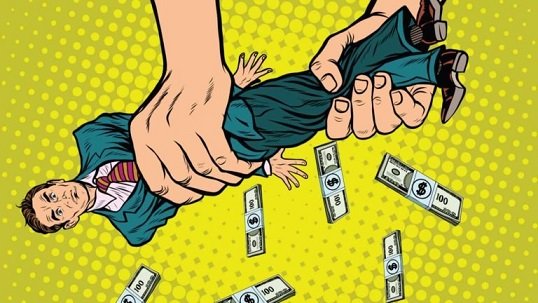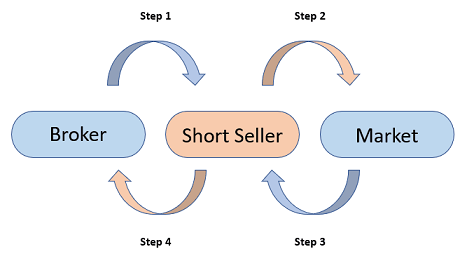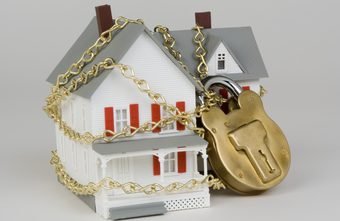
Borrow == Shorts
I've come to realize that borrowing an asset and shorting it are exactly the same thing the vast majority of the time. Want to buy a car or a house? You'll need a loan from the bank. Many people see their home as the ultimate investment. The borrower is shorting USD and going long on real estate. This asset is not only an investment, but also has utility because one needs a place to live regardless.
I do not necessarily believe that real estate really is an investment; at least not anymore. The entire concept seems flawed to me after everything I've learned. Why would a house go up in value over time as the materials that the house is made of continue to slowly disintegrate? How can a house go up in value when technology should be making it easier to build them? Indeed, a house can only be seen as an investment if the unit-of-account it's being measured against (USD) is going down faster than the value of the home.
Once we realize this it's easy to see that real estate isn't really a very good investment at all but can still act as a SOV (store of value) against fiat debasement. It's also important to point out that the utility of what's build on the land (a building) is often less valuable than the actual plot of land itself. After all, as population increases the amount of land in existence can only ever stay the same. The Earth isn't getting any bigger. Demand increases while supply stays the same. For now (see: demographics).
Mars perhaps?
Property tax also completely cripples the entire concept of real estate ownership and SOV. How can someone own a thing that stores value if it's actually the government that owns it while forcing you to pay them 'protection money' at gunpoint? Property tax bleeds SOV from real estate every year and most people just carry on with an, "it is what it is," attitude about it.

Point being that people are not actually allowed to assets of great importance. 'Owning' your own home is just renting from the government for a relatively cheap price. They pinky promise it's yours until they decide to legally take it back using civil asset forfeiture laws.
We are not allowed to own the means of production either. We can not own a factory that makes smartphones. We can buy stock in a company that produces smartphones, but again who actually owns that stock? More can be printed on the whim of the real owners of the company. More often than not it is the banks who end up owning the means of production at scale. Everybody sells out sooner or later.
We can't even own money.
It was a shocking revelation when I realized that physical cash in your pocket isn't money at all. It's debt. The ramifications of such a broken and busted system are really starting to reveal themselves these days, and it's actually kind of depressing. This is why an asset like Bitcoin ends up being quite a fascinating puzzle piece that seem to fill a missing niche within society.
With BTC, we can finally actually own something without worrying about other powerful players within the ecosystem manipulating the rule for solely their own benefit as we see in every other aspect of the world. At least that's the idea anyway (INB4 comment section).
How much longer until governments worldwide try to levy "property taxes" on citizens' BTC holdings? Well actually that's exactly how ETFs work apparently which is what I talked in the post I wrote 3 days ago. Hopefully the 1% or whatever it is they charge per year becomes nothing but an inconsequential nuance, but either way it will always be a stark reminder that BTC ETF holders don't actually own BTC. They own debt, (an IOU) just like the system intended.

Shorting USD
It seems like the smartest thing in the world to borrow/short as much USD as possible. After all, the value is always declining. The problem with this strategy is that loans come with those pesky strings attached called interest rates. If we load up on $20,000 of credit card debt at 30% APR (CC rates are absolutely insane these days) it's highly unlikely that such an "investment" could ever be worth it.
After all, what do people actually buy with credit cards? Clothes? Dining? Bars? Night clubs? Shoes? Vacations? None of these things are actually investments. They are just things that people might want within the economy. Consumables. Vapor.
A motor vehicle could be seen as an investment, but only if we need one to do a job. The utility is undeniable but then we trade our time for money while often making someone else rich. It's quite hard to get the upper hand in the scenario for the vast majority of the population, especially when we've been brainwashed into surrendering any and all discipline. Instant gratification and living paycheck to paycheck are the gods of this world now.
The ultimate short on USD is getting a business loan and creating a profitable small enterprise. Of course this is much easier said than done. After all: half of all businesses fail within the first 5 years. How many more are barely scraping by with little chance to expand?

Shorting BTC (number go down)
Many are worried about 'paper Bitcoin' manipulating the market downward. After all we saw exactly how FTX played it; literally as aggressive as humanly possible. They had ZERO Bitcoin on the books and however many billion in liabilities owed back. Those who sent BTC to FTX were liquidated immediately, and those who bought BTC on FTX were issued a meaningless IOU.
Luckily, unlike gold, silver, or any other derivative known to man, anyone can take custody of BTC. Citizens can not take custody over gold. You buy gold online and what you get is a number in a database that's only as good as the reputations of the institutions that control it. Same thing with stocks. We can not withdraw a stock from an exchange and own it; that would be ridiculous. However we can do that with crypto which is very significant.
First off it means that naked shorting Bitcoin is literally impossible. A naked short is when an asset is sold that never even existed in the first place. This is how Melvin Capital got vaporized in the Gamestop short squeeze. Simply the idea that they could have been naked shorting GME incentivized the financial world's most notorious squeeze.
But because Bitcoin is a global censorship-resistant network this strategy is quite impossible. If an exchange sold more BTC than existed on their books then arbitragers would buy the cheap Bitcoin and immediately attempt to withdraw it to other exchanges in order to sell it for instant profits. The rogue exchange would then be forced to buy back BTC from another exchange if only to fulfil the arb requests, which completely undermines the entire strategy. The exchange would lose money for no reason.
There are many financial manipulations that simply can not happen with crypto because of the fact that users can take custody of it. Obviously we must continue educating the 'normies' about this and teaching them how they can secure their own assets whenever possible. Hell, perhaps one day a crypto token will pop up who's only purpose is to teach the masses how to do these things by paying them to learn. How would they stop Sybil attack while creating a circular economy? No idea. It's basically not something that can exist under the roof of current infrastructure. But development isn't slowing down anytime soon so who knows where we'll be in 10 years.

Conclusion
Over a long enough timeline, those that short Bitcoin get completely obliterated. This has a tendency to put crypto in a permanent win/win situation. Is it bad that Blackrock is getting into the spot ETF game? What happens if they print fake paper Bitcoin?
Who cares?
If they print fake paper Bitcoin they'll eventually go bankrupt over it, and if they don't then they're just another trusted party ready to adopt the new paradigm. This is the fabulous thing about the 4-year cycle and the 1-year bear market: it only takes one cycle to annihilate the majority of corruption and garbage that exists within the environment.
Essentially the only way to hedge against greedy institutions doing greedy institutional things is to cut them out of the equation. We all know the rules: not your keys not your crypto. Such a simple phrase with such powerful subtext. Never forget this fact, as the next bull will be here before you know it: whispering its greedy little secrets and promises of wealth if you just 'trust us'. Don't fall for it. We've all been doing this long enough to know better.
Indeed!
One caveat, you can buy a stock, and have it transferred from the exchange to the broker to you, and then call up the corporation and have it placed in your name.
Of course, when you do this, you find out just how bad the system is.
They may try to bribe you to not take the stock off the exchange. They will actually offer you more than it is worth.
Or, you may get a CDCC failure to deliver. Or, in laymen's speech, you never owned it… sucker.
They want an ETF because they own the bitcoin, while their customers play around with the paper. Anything happens, and they end up with the bitcoin.
Unfortunately, for them, bitcoin is going to wreck the ETFs. Bitcoin is going to shoot up, while they are supposed to be buying to match ETF purchases, and then it is going to drop so fast that the order books can't keep up. The shorts and the longs will get wrecked, coming and going. And then, bitcoin becomes unobtanium. No one is selling for The US paper. People will have to be paid out cash value, which, unless the Fed is really behind them, is more dollars than anyone has.
And then, maybe people will realize, they could have just bought bitcoin, the real thing, all along.
That is exactly why I continue to stack BTC. Long ago I realized that owning land was a bad deal thanks to property tax, just fail to make your payments for a couple years and see what what happens! The government takes it away...
I do like gold and silver that I possess, never let someone else control your assets. The one risk with gold is the government can make it illegal to own gold just like President F. D. Roosevelt did in the 1930's. In a way that's why I like silver a bit more.
Now if those idiots start trying to print "paper" BTC they may as well get ready to file for bankruptcy. But hey, it's their funeral...
Great post and great advice, always be the custodian on all your crypto!
If crypto moons I'm definitely going to buy some silver.
Jury is still out on gold put I'd probably pick some up as well.
The thing about physical gold and silver is that there is very much a cap on how much I would be comfortable holding in person. To me it's a much bigger hedge than an investment (I don't expect value to perform well), it's just more like an oh-shit button just in case, so I'd never want more than like $10k-$20k even if I was a crypto millionaire.
these days it’s not surprising that the ETF is finally going to be accepted but what it does was something I didn’t k is a lot about. I have a better understanding of it now, so thanks for that. It’s truly disgusting how asset owning is such an abhorrent thing to these psychos. It all comes full circle doesn’t it? Feudalism the peasants worked the land but never owned it. These days we don’t own most assets either but work the economy. What a wild paradigm, I wonder what it will take to change that. Crypto could certainly be a step in the right direction for ownership.
don't know why people can't see than an ETF and Blackrock is a MASSIVE RED FLAG.
don’t disagree with you at all there. People have sold out for money the way others have before them. I personally don’t want the ETF but what say do I have?
Bitcoin is certainly interesting in that it is a quantity limited asset - and some fraction of Bitcoin is lost or abandoned every year.
Each and every month you can count on every dollar you own to be diluted like clockwork.
One correction you can absolutely purchase physical precious metals though you will generally pay a premium above the spot melt price of the metal.
You can't purchase PMs at scale which I believe is what I said.
Gold can't be transported at scale either.
These logistics issues matter a great deal.
Digital paper gold is worth more than the real stuff because it exists online.
That's why gold mooned when its ETF launched.
real estate or housing one of those corrupted place to invest, either gov rob you with those taxes or property go into custody of those mafias that's how things are in here.
This is so true, man what a legit explanation you've given in this.
They'll never want to add this true concept of money in education system but convincing everyone to live up to paycheck to paycheck.
Ever since that FTX thing happened I've taken this self custody is way too serious... literally have written those seeds in multiple places...
I also do not see real estate as a big investment anymore
It's crazy but it is the truth
The value in house price increase is the amenities around the property and also the fact that wages keep going up, materials go up and people will always need somewhere to live.
You can own physical PMs, stock certificates, and means of production. You can own real estate. All you have to do is defend it from anyone that says you owe them for it.
Thanks!
A person can do all of these things, but not at scale.
Everything that exists at scale is heinously centralized.
A problem that possibly could be rectified by crypto.
Maybe.
That means taking a loan against BTC collateral is a function equivalent of a shot and buying more BTC with that making the whole trade an inverse short, aka long against your trading pair - by default USD. You're still trapped with the USD dependency.
Not quite sure what you're getting at here.
USD as a measurement (unit of account) is not really a dependency.
It is simply convenient as the world's most stable UoA.
If it was no longer stable it would be abandoned quickly, thus not necessary.
I'm not sure how one can be "trapped" by an asset they're shorting,
as the entire point of shorting that asset is to bet against it.
It's a mental exercise, I'm following your words and around and that was a hypothesis that hit me spontaneous.
As long as your UoA is dropping 3-4% annually, it's not great. Do we have anything more stable right now on this planet?
The amount that it drops per year has little to do with the volatility or stability of the asset. If the loss is a gradual 3% grade that slopes down in a straight line that's a perfectly stable outcome as far as UoA is concerned. Whereas if it's up 5% one day and down 10% the next day with an average of 3% down that's a completely different scenario.
If I can pick an asset at random and attach a price to it: like $10 for 5 pounds of apples ($2/pound), and you can tell me if that's a good price or a bad price, then UoA is working. If not then not.
That's a great way to put it.